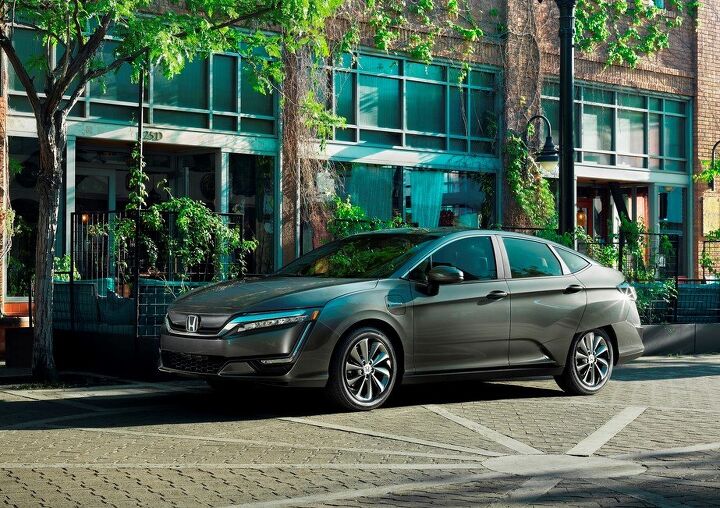If Only the Range Matched the Price: Honda's Clarity EV Leasing for $199 a Month

By that, we mean the figure “199,” not the overall cost of leasing. Moving on…
Honda’s only true EV, the Clarity Electric, began arriving at dealers in California and Oregon Thursday, completing a green trifecta that includes a plug-in hybrid variant and hydrogen fuel cell model. It also carries a lease price that undercuts its rivals by quite a bit.
While Clarity EV lessees stand to pay significantly less for their eco-conscious ride, both up front and on a monthly basis, they’d best familiarize themselves with the location of charging stations.
That’s because the Clarity EV has a range of just 89 miles. No, you haven’t travelled back in time to 2012 — it’s just that the Clarity’s battery space is constrained by Honda’s need for a platform that accommodates three propulsion sources.
Because of this, the Clarity EV’s 25.5 kWh battery pack doesn’t measure up to its competitors, though the range is usable for around-town trips and most commutes. (This author still remembers the gnawing fear felt during a long weekend Ford Focus Electric test a few years back. That model offered 76 miles of range.)
Honda clearly recognizes the car’s limitations in its lease offer. City driving is where EVs shine, and, if you never leave city limits, this large, comfortable cruiser makes an attractive proposition. With $1,499 due at signing, lessees pay $199 a month for 36 months. Drivers might find themselves eligible for state incentives totalling $2,500, too, depending on the date and their place of residence.
“We’re upping the ante on both premium appeal and affordability with the 2018 Honda Clarity Electric,” said Steven Center, Honda’s vice president of Connected and Environmental Business Development, in a statement. Center made sure to mention the Clarity’s “premium level of quality” compared to other lower-priced EVs.
Looking at lease offers in the Los Angeles area, the Clarity beats its rivals hands down. A Chevrolet Bolt leases for $376 a month for a 36-month term, with $4,125 due at signing. Mileage tops out at 30,000 miles. The Bolt is the low-priced rangte leader, boasting 238 miles per charge.
Nissan’s newly upgraded Leaf, now offering 151 miles per charge, leases for $229 a month for 36 months, with $3,979 due at signing. The automaker allows 12,000 miles of emission-free driving per year. Compared to that, Hyundai’s Ioniq Electric, only available in California, leases for $295 a month for the same term, but carries a lower down payment of $2,500. Mileage is unlimited.
Honda’s lease allows 20,000 miles per year, plus free roadside assistance. That’s a lot of recharging cycles.
[Images: Honda]

More by Steph Willems
Latest Car Reviews
Read moreLatest Product Reviews
Read moreRecent Comments
- Varezhka I have still yet to see a Malibu on the road that didn't have a rental sticker. So yeah, GM probably lost money on every one they sold but kept it to boost their CAFE numbers.I'm personally happy that I no longer have to dread being "upgraded" to a Maxima or a Malibu anymore. And thankfully Altima is also on its way out.
- Tassos Under incompetent, affirmative action hire Mary Barra, GM has been shooting itself in the foot on a daily basis.Whether the Malibu cancellation has been one of these shootings is NOT obvious at all.GM should be run as a PROFITABLE BUSINESS and NOT as an outfit that satisfies everybody and his mother in law's pet preferences.IF the Malibu was UNPROFITABLE, it SHOULD be canceled.More generally, if its SEGMENT is Unprofitable, and HALF the makers cancel their midsize sedans, not only will it lead to the SURVIVAL OF THE FITTEST ones, but the survivors will obviously be more profitable if the LOSERS were kept being produced and the SMALL PIE of midsize sedans would yield slim pickings for every participant.SO NO, I APPROVE of the demise of the unprofitable Malibu, and hope Nissan does the same to the Altima, Hyundai with the SOnata, Mazda with the Mazda 6, and as many others as it takes to make the REMAINING players, like the Excellent, sporty Accord and the Bulletproof Reliable, cheap to maintain CAMRY, more profitable and affordable.
- GregLocock Car companies can only really sell cars that people who are new car buyers will pay a profitable price for. As it turns out fewer and fewer new car buyers want sedans. Large sedans can be nice to drive, certainly, but the number of new car buyers (the only ones that matter in this discussion) are prepared to sacrifice steering and handling for more obvious things like passenger and cargo space, or even some attempt at off roading. We know US new car buyers don't really care about handling because they fell for FWD in large cars.
- Slavuta Why is everybody sweating? Like sedans? - go buy one. Better - 2. Let CRV/RAV rust on the dealer lot. I have 3 sedans on the driveway. My neighbor - 2. Neighbors on each of our other side - 8 SUVs.
- Theflyersfan With sedans, especially, I wonder how many of those sales are to rental fleets. With the exception of the Civic and Accord, there are still rows of sedans mixed in with the RAV4s at every airport rental lot. I doubt the breakdown in sales is publicly published, so who knows... GM isn't out of the sedan business - Cadillac exists and I can't believe I'm typing this but they are actually decent - and I think they are making a huge mistake, especially if there's an extended oil price hike (cough...Iran...cough) and people want smaller and hybrids. But if one is only tied to the quarterly shareholder reports and not trends and the big picture, bad decisions like this get made.



































Comments
Join the conversation
Just saw one of these in the wild Friday here in the Peoples Republic of Oregon. Had no idea that the release was so limited....just like the range.
"Being designed for 3 different powertrains" being the factor that limits the range sounds like a lame excuse. There has to be a ton of unused space under the hood.